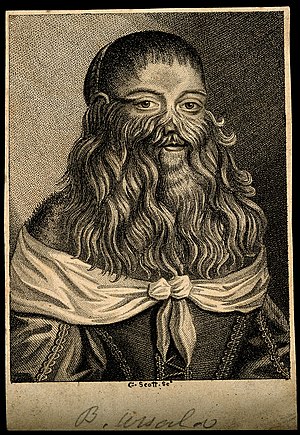Hirsute
| Hirsutism | |
|---|---|
 |
|
| Barbara van Beck, wife of Michael van Beck, as depicted in an engraving by G. Scott. | |
| Classification and external resources | |
| Specialty | Dermatology, endocrinology |
| ICD-10 | L68.0 |
| ICD-9-CM | 704.1 |
| DiseasesDB | 20309 |
| MedlinePlus | 003148 |
| eMedicine | med/1017 derm/472 |
| MeSH | D006628 |
Hirsutism is excessive body hair in men and women on parts of the body where hair is normally absent or minimal, such as on the chin or chest in particular, or the face or body in general. It may refer to a male pattern of hair growth that may be a sign of a more serious medical condition, especially if it develops well after puberty. It can be caused by increased levels of androgen hormones. The amount and location of the hair is measured by a Ferriman-Gallwey score. It is different than hypertrichosis, which is excessive hair growth anywhere on the body.
Hirsutism is usually the result of an underlying endocrine imbalance, which may be adrenal, ovarian, or central. Hirsutism is a commonly presenting symptom in dermatology, endocrinology, and gynecology clinics, and one that is considered to be the cause of much psychological distress and social difficulty. Facial hirsutism often leads to the avoidance of social situations and to symptoms of anxiety and depression.
Hirsutism affects between 5–15% of all women across all ethnic backgrounds. Depending on the definition and the underlying data, estimates indicate that approximately 40% of women have some degree of unwanted facial hair.
Hirsutism affects members of any gender, since rising androgen levels can cause excessive body hair, particularly in locations where women normally do not develop terminal hair during puberty (chest, abdomen, back, and face). The medical term for excessive hair growth that affects any gender is hypertrichosis.
Hirsutism can be caused by either an increased level of androgens, the male hormones, or an oversensitivity of hair follicles to androgens. Male hormones such as testosterone stimulate hair growth, increase size and intensify the growth and pigmentation of hair. Other symptoms associated with a high level of male hormones include acne, deepening of the voice, and increased muscle mass.
...
Wikipedia
